Spotlight: Steven Stain, MD

As the youngest child of a family medicine physician, Steven Stain, MD always knew he wanted to be a doctor, just like his father.
"All four of my siblings started pre-med, and all of them quit but me," he laughs.
When Dr. Stain enrolled at University of California, Irvine School of Medicine, he intended to go into primary care. However, he found he loved surgery more, even though he says it was different from what he expected.
"It's not just the technical piece of performing surgery that I enjoy," he says. "It's also being able to take care of patients before and after surgery. My choice was a good one."
Before accepting the job as Chair of the Department of Surgery at BILH's Lahey Hospital & Medical Center, Dr. Stain was the Chair of Surgery at two schools-one in Albany, NY and the other in Nashville. He was looking for the opportunity to do something different, and felt like coming to practice medicine in Boston was like coming to the "big leagues."
"Learning how medicine is practiced here in the clinic model has been interesting and educational for me. The fact that you can walk upstairs and then downstairs and see how people in different specialties practice side-by-side is amazing."
Dr. Stain feels his greatest accomplishment in medicine has been working with the people he's trained. Some of his former trainees have gone on to hold impressive positions, including the Chief of Trauma at Brigham & Women's Hospital, and the Vice Chair of Surgery at Stanford Health Care.
"The research I've done is enjoyable, but the experience of working and training others is what I feel best about," he says.
Dr. Stain says he's fortunate to have had both Black and white mentors who have helped open doors for him. However, early on in his career, he had some issues with another faculty member.
"It came down to who was going to be an author on a paper," he remembers. "It made me recognize that not everyone was on my side, and maybe I needed to work someplace else. I had to reach down deep and decide what to do. Was I willing to move my family? In the end, it took me a long time to find another job, but that experience-though trying-forced me to make other decisions that have helped in my advancement. Without that, I would likely still be in the same job."
As for the future of medicine? Dr. Stain says the field needs underrepresented minority physicians to take care of patients.
"There are advantages to having a concordance of race and gender," he states. "We need to expand opportunities for people so they can go into the health field. We need to provide counseling for those who require assistance negotiating the pre-med environment, and then identify physicians and students to give them the opportunities to fulfill those dreams."
"I think being a physician is the greatest job possible," he says. "Ultimately, none of my kids decided to go into medicine. They're all accomplished and I want them to be happy. But I feel fortunate I found a career I really love. I think it's a calling. And for those who want to take on the mantle of being a physician? It's worth all the effort."
